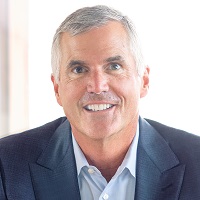Why More Retirees Might Come Out of Retirement
It’s often not solely because of financial reasons, but because of a lack of purpose in retirement. This financial expert can relate.


Profit and prosper with the best of Kiplinger's advice on investing, taxes, retirement, personal finance and much more. Delivered daily. Enter your email in the box and click Sign Me Up.
You are now subscribed
Your newsletter sign-up was successful
Want to add more newsletters?

Delivered daily
Kiplinger Today
Profit and prosper with the best of Kiplinger's advice on investing, taxes, retirement, personal finance and much more delivered daily. Smart money moves start here.

Sent five days a week
Kiplinger A Step Ahead
Get practical help to make better financial decisions in your everyday life, from spending to savings on top deals.

Delivered daily
Kiplinger Closing Bell
Get today's biggest financial and investing headlines delivered to your inbox every day the U.S. stock market is open.

Sent twice a week
Kiplinger Adviser Intel
Financial pros across the country share best practices and fresh tactics to preserve and grow your wealth.

Delivered weekly
Kiplinger Tax Tips
Trim your federal and state tax bills with practical tax-planning and tax-cutting strategies.

Sent twice a week
Kiplinger Retirement Tips
Your twice-a-week guide to planning and enjoying a financially secure and richly rewarding retirement

Sent bimonthly.
Kiplinger Adviser Angle
Insights for advisers, wealth managers and other financial professionals.

Sent twice a week
Kiplinger Investing Weekly
Your twice-a-week roundup of promising stocks, funds, companies and industries you should consider, ones you should avoid, and why.

Sent weekly for six weeks
Kiplinger Invest for Retirement
Your step-by-step six-part series on how to invest for retirement, from devising a successful strategy to exactly which investments to choose.
With ongoing inflation, high interest rates and volatility continuing to impact the market, it isn’t hard to see why Americans are increasingly concerned about outliving their nest egg. As a result, many are rethinking their retirement.
According to a recent survey from F&G, half (50%) of pre-retired and retired Americans are considering delaying or coming out of retirement. Financial factors are certainly a reason, with 52% of pre-retirees worried they won’t have enough money in retirement, and 42% of retirees worried about inflation. But money doesn’t tell the whole story, as the report also revealed that many Americans are returning to work for non-financial reasons — something that I can relate to as well.
Retirement is more than financial independence
Conventional wisdom may say someone would never return to work after retiring unless they were financially forced to, but the reality is many Americans are considering going back to work simply because it makes them feel good. In fact, 50% of retirees are considering “unretiring” because they enjoy the intellectual challenge/stimulation from working, and 36% feel a lack of purpose in retirement.
From just $107.88 $24.99 for Kiplinger Personal Finance
Become a smarter, better informed investor. Subscribe from just $107.88 $24.99, plus get up to 4 Special Issues

Sign up for Kiplinger’s Free Newsletters
Profit and prosper with the best of expert advice on investing, taxes, retirement, personal finance and more - straight to your e-mail.
Profit and prosper with the best of expert advice - straight to your e-mail.
These responses resonated with me. I was briefly retired, then made the decision to return to the workforce for non-monetary reasons, which is how I eventually took on a new challenge at F&G. The report shows more Americans are having the same feelings I had. Earlier in my career, when I thought of retirement, I saw it as synonymous with achieving financial freedom. That was more important to me than the general idea of “stopping work.” I've always enjoyed working and being a part of a team, but with retirement I was excited about having more control over my life and spending more of my time on the things I wanted to pursue.
When I initially retired, I loved having freedom over my day, but this feeling was short-lived. After a while, I noticed myself missing the camaraderie of the workplace. Growing up, I played a lot of team sports, and I didn't appreciate how work had become my “adult team sport” later in life. Ultimately, that feeling of missing something persisted until I made the decision to “unretire” and get back to working again.
The new idea of retirement and how to get there
Just as hybrid work has emerged over the last few years, we’re seeing “hybrid retirement” become more common. Many folks are realizing that the old vision of retirement as working one day, then being completely retired the next is no longer an attractive prospect. Generations are also now wired differently, and people are approaching retirement differently than their parents or grandparents. They want to learn, achieve goals and spend time with other people who share similar passions. So how can they ensure that happens?
Looking back, the best retirement planning advice I received was 1) plan for it in advance, envisioning what your daily life will look like, and 2) don’t overcommit yourself in the first year of retirement.
It’s important to financially plan for retirement, but people approaching retirement also need to plan for their life goals. It’s critical to carefully think through what you'd like retirement to look like. Do you want to travel? Spend more time with family, such as your grandkids? Volunteer? For people in a relationship, especially, it’s easy to make assumptions that can lead to disappointment, so aligning on a common vision is a critical first step. Once someone can identify what will inspire and bring them purpose in retirement, they can make a plan to ensure they are working to achieve it.
Experts can help
One of the best ways people can ensure they are well positioned to achieve the retirement they want, both financially and non-financially, is to speak with a financial adviser or similar professional.
Surprisingly, the survey found that half (50%) of pre-retirees and retirees don’t currently work with a financial adviser. This is a huge missed opportunity for people to get input about their retirement plan and goals. Speaking with an adviser can alleviate concerns around inflation and outliving savings and ensure individuals have the right products to meet their needs. For example, retirees and pre-retirees may want to consider options such as annuities, which can provide peace of mind and guaranteed income for life regardless of what happens in financial markets. For financial advisers, it’s also a chance to look beyond just the portfolio and lean into the role of “life coach” to help clients plan for overall happiness as well.
Ultimately, Americans’ retirement views are changing and moving beyond just financial concerns. Everyone’s life situation, goals and “dream retirement” are different, so there’s no one formula based on age or when or how to retire. For example, for Baby Boomers considering pushing back their retirement, the top reason they are doing so is because they enjoy the intellectual challenge/stimulation from working (51%), whereas for Gen Xers the top reason is tied between being worried about inflation (45%) and wanting more financial options and a larger safety net (45%).
Spending time today reviewing your concerns, understanding your goals and building a plan to get there can pay off for years to come. Once people have that added direction, they won’t have to worry about feeling like they are missing something in retirement. Instead, they’ll enter that next chapter more financially secure and personally fulfilled.
Note: The F&G survey was conducted online by Directions Research and fielded from June 7 to June 16, 2023, among a nationally representative sample of 2,015 U.S. adults 18 years of age and older. Respondents were targeted to Americans Aged 50+, who are financial decision-makers and have $100K+ in financial products/savings.
Related Content
- Leaving Retirement? Three Things to Consider Before You Unretire
- If You Work in Retirement, Can You Save in a Retirement Plan?
- Making Your Retirement Savings Last: Three Key Questions to Ask
- Retirement Is a Journey: Do You Have the Map?
- How to Plan for Your Three Acts of Retirement
Profit and prosper with the best of Kiplinger's advice on investing, taxes, retirement, personal finance and much more. Delivered daily. Enter your email in the box and click Sign Me Up.

For more than 30 years, Chris Blunt has held senior leadership positions at several major insurance and financial services companies. He joined F&G in 2019 and currently serves as the Chief Executive Officer. Prior to that, he served as Chief Executive Officer at Blackstone Insurance Solutions and spent nearly 13 years at New York Life in a variety of executive roles.
-
 Quiz: Do You Know How to Avoid the "Medigap Trap?"
Quiz: Do You Know How to Avoid the "Medigap Trap?"Quiz Test your basic knowledge of the "Medigap Trap" in our quick quiz.
-
 5 Top Tax-Efficient Mutual Funds for Smarter Investing
5 Top Tax-Efficient Mutual Funds for Smarter InvestingMutual funds are many things, but "tax-friendly" usually isn't one of them. These are the exceptions.
-
 AI Sparks Existential Crisis for Software Stocks
AI Sparks Existential Crisis for Software StocksThe Kiplinger Letter Fears that SaaS subscription software could be rendered obsolete by artificial intelligence make investors jittery.
-
 Social Security Break-Even Math Is Helpful, But Don't Let It Dictate When You'll File
Social Security Break-Even Math Is Helpful, But Don't Let It Dictate When You'll FileYour Social Security break-even age tells you how long you'd need to live for delaying to pay off, but shouldn't be the sole basis for deciding when to claim.
-
 I'm an Opportunity Zone Pro: This Is How to Deliver Roth-Like Tax-Free Growth (Without Contribution Limits)
I'm an Opportunity Zone Pro: This Is How to Deliver Roth-Like Tax-Free Growth (Without Contribution Limits)Investors who combine Roth IRAs, the gold standard of tax-free savings, with qualified opportunity funds could enjoy decades of tax-free growth.
-
 One of the Most Powerful Wealth-Building Moves a Woman Can Make: A Midcareer Pivot
One of the Most Powerful Wealth-Building Moves a Woman Can Make: A Midcareer PivotIf it feels like you can't sustain what you're doing for the next 20 years, it's time for an honest look at what's draining you and what energizes you.
-
 I'm a Wealth Adviser Obsessed With Mahjong: Here Are 8 Ways It Can Teach Us How to Manage Our Money
I'm a Wealth Adviser Obsessed With Mahjong: Here Are 8 Ways It Can Teach Us How to Manage Our MoneyThis increasingly popular Chinese game can teach us not only how to help manage our money but also how important it is to connect with other people.
-
 Looking for a Financial Book That Won't Put Your Young Adult to Sleep? This One Makes 'Cents'
Looking for a Financial Book That Won't Put Your Young Adult to Sleep? This One Makes 'Cents'"Wealth Your Way" by Cosmo DeStefano offers a highly accessible guide for young adults and their parents on building wealth through simple, consistent habits.
-
 Global Uncertainty Has Investors Running Scared: This Is How Advisers Can Reassure Them
Global Uncertainty Has Investors Running Scared: This Is How Advisers Can Reassure ThemHow can advisers reassure clients nervous about their plans in an increasingly complex and rapidly changing world? This conversational framework provides the key.
-
 I'm a Real Estate Investing Pro: This Is How to Use 1031 Exchanges to Scale Up Your Real Estate Empire
I'm a Real Estate Investing Pro: This Is How to Use 1031 Exchanges to Scale Up Your Real Estate EmpireSmall rental properties can be excellent investments, but you can use 1031 exchanges to transition to commercial real estate for bigger wealth-building.
-
 Should You Jump on the Roth Conversion Bandwagon? A Financial Adviser Weighs In
Should You Jump on the Roth Conversion Bandwagon? A Financial Adviser Weighs InRoth conversions are all the rage, but what works well for one household can cause financial strain for another. This is what you should consider before moving ahead.